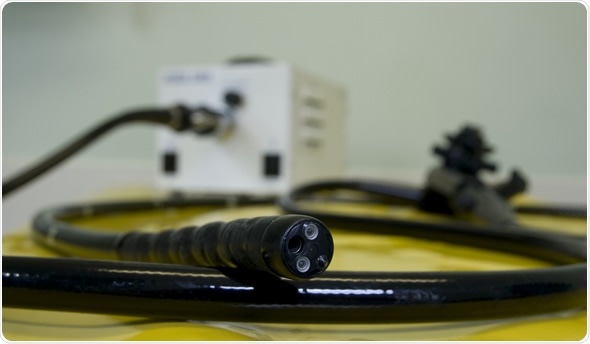Flexible sigmoidoscopy (FS) is a procedure carried out at a hospital or outpatient center that allows the visualization of the rectum and sigmoid colon.
This procedure might be suggested for screening for cancer and in patients who report rectal bleeding and any associated symptoms, such as abdominal pain, weight loss and/or changes in bowel habits.
FS can illustrate bowel pathologies with regards to polyps, ulcers and inflammation. There is a camera attached to the scope with which images are acquired.
In addition to this, interventions, such as drug administration, poly removal and biopsy acquisition, may all be conducted through the sigmoidoscope where applicable.

An endoscope - Imag Copyright: Chrispo / Shutterstock
Preparation for the Procedure
In preparing for FS, a person has to cleanse the bowel as the presence of stool significantly reduces the optimal visualization of the colon. Patients are given bowel prep instructions that may be easily followed at home.
These instructions typically include a liquid diet 1 to 3 days prior to undergoing the procedure. Patients are also advised to avoid food that contains dyes or coloring.
Several hours before the examination, the patient self-administers a laxative which loosens the stool and increases passage. This may be done orally in liquid or pill form. An enema, is a procedure that entails flushing water into the rectum, is also conducted. Patients are advised to ensure easy access to a toilet as both enemas and laxatives may induce diarrhea.
This bowel preparation is critical to the success of the FS procedure, without which visualization of the sigmoid colon will be nearly impractical.
In addition to cleansing the bowel, patients are required to inform their doctors of any pre-existing medical conditions and medications that they are on. This is especially important for patients who are diabetic or on medications such as iron supplements, blood thinners, aspirin and nonsteroidal anti-inflammatory drugs.
There may be a need to adjust dosage of these medications or to temporarily stop intake.
During the Procedure
FS lasts for about 20 to 30 minutes and is usually well-tolerated by most people. The scope is inserted into the anus and gradually advanced through the rectum to the sigmoid colon. Where needed, biopsies may be taken and these are painless. In general, some patients may feel some abdominal cramping, pressure or bloating during the procedure.
Bleeding and bowel perforation are the two most common complications that may arise during FS. Cases of bleeding are frequently associated with polyp removal and these are immediately treatable with the administration of drugs through the sigmoidoscope or an electrical probe.
In cases of perforation, surgery is required. Other rare but possible complications include diverticulitis (inflammation of small pouches in the colon) and cardiovascular problems such as low blood pressure and cardiac arrhythmias.
Flexible Sigmoidoscopy
Aftermath and Results
It is not unusual to experience some cramping or bloating an hour or two after FS. Despite these symptoms, patients may immediately resume their normal everyday lives with regards to diet and activities.
Some results may be available immediately following the test and these can be made known to the patient. However, those that require analysis (e.g. biopsies) may take more time for processing.
A negative result indicates no abnormalities in the examined areas whereas a positive result means abnormal tissue or polyps were found and additional testing may be required for further examination of the discovered pathologies.
References
Further Reading
Last Updated: Dec 29, 2022